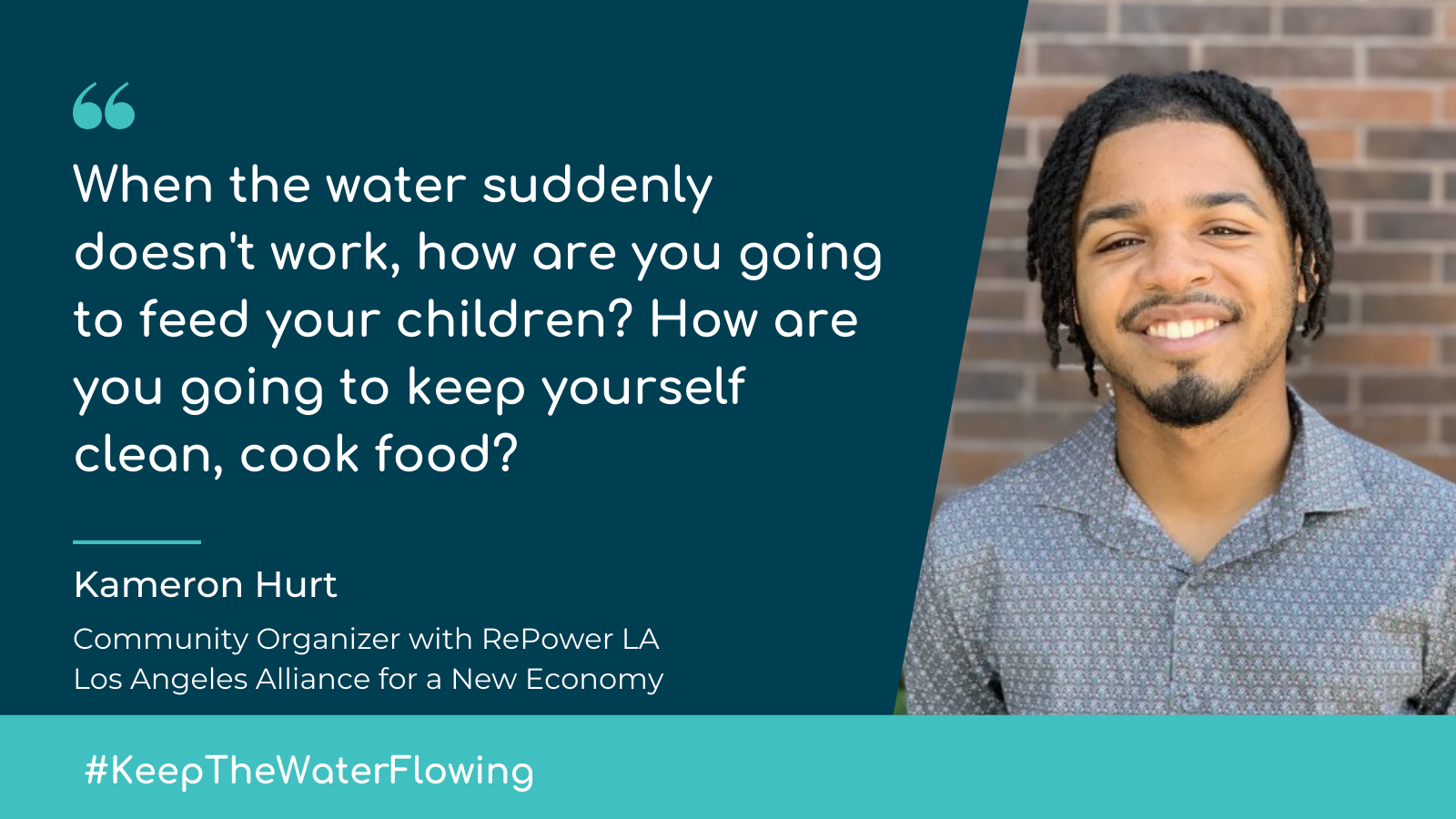Each month, the Water Hub is checking in with advocates and organizers in California to talk about the water issues impacting local communities. With Los Angeles Department of Water and Power (LADWP) extending the moratorium on utility shut-offs through March 2022, we spoke with Kameron Hurt about drought impacts in LA, the importance of water and power as a human right, and how Repower LA is working to protect Los Angeleans from the burden of utility debt.
Water Hub: Tell us a little bit about yourself and your role at LAANE.
Kameron Hurt: I’m originally from the East Coast. I moved to Los Angeles to attend school here and then through educating myself more about Los Angeles, I really fell in love with organizing and working with frontline communities who live here, and decided to basically stay three years after I graduated.
Currently with LAANE, my role is a community organizer on our Repower LA coalition campaign. My role is bringing together environmental, labor, and community-based organizations who are dedicated to an energy-efficient future for our city’s frontline communities.
 Water Hub: What water issues are top of mind in your community right now?
Water Hub: What water issues are top of mind in your community right now?
KH: Environmental justice is always an important concern for us on both the Water and Power campaigns, meaning that we have to promote universal and free access to clean water for frontline communities who are most vulnerable to contaminated water, to shut-offs and to being hardest hit by environmental disasters.
In general, there are some disproportionate effects of the climate catastrophe on Black and Brown working class communities, which means that it’s really vital to represent their interests.
We strongly believe that the drought is an incredibly important issue for Los Angeles because we are still in a drought. So, it’s a top priority that we invest in local and sustainable water, with the goal of creating good jobs and increasing access to safe, affordable water for frontline communities.
Water Hub: What do you want policymakers and journalists to better understand about the issue of utility debt, power and water shut-offs?
KH: What I want policymakers, journalists, and the people who are interested in justice to understand is that utilities, including water, power and even more, are human rights. They are things that we don’t believe should be subject to shut-offs due to nonpayment.
What I learned through talking with so many community partners and residents, has been just the terror that you feel when the power suddenly cuts off, you know, when the water suddenly doesn’t work, how are you going to feed your children? How are you going to keep yourself clean, cook food? All of these things are deeply impacted. I believe that it should be well known, anytime that decision is made to shut someone’s water or power off, just how much is happening on the other end of that decision that maybe the policymaker doesn’t see for themselves.
And we also believe that journalists, when covering these stories, should definitely do their best to talk to residents, talk to people who have experienced shut-offs and really prioritize the perspective of communities that have been devastated by the economic impacts of the COVID-19 crisis, and so much more.
 Water Hub: LADWP has a moratorium on utility shut-offs through March 2022, but California’s statewide shut-off moratorium recently expired, and it feels like there’s more of a need for utility debt relief than there are funds to go around. How have you seen this play out in your work?
Water Hub: LADWP has a moratorium on utility shut-offs through March 2022, but California’s statewide shut-off moratorium recently expired, and it feels like there’s more of a need for utility debt relief than there are funds to go around. How have you seen this play out in your work?
KH: LADWP reported in an October 2021 Board of Commissioners meeting that many customers will still have arrears after relief is distributed. As of July 31, 2021, there was $806 million in utility debt that wasn’t paid for over 61 days. Statewide relief was only provided for debts incurred between March 4, 2020 to June 15, 2021, which doesn’t truly cover the full effects of the pandemic. $413 million was requested in state relief, leaving $393 million in the minimum estimated remaining debts. Since these numbers are from July, it’s safe to assume that there’s even more utility debt than that $393 million since working class communities are still feeling the economic shock of the ongoing crisis.
In our advocacy and organizing, we’ve been able to win some major victories like $2 billion in state utility debt relief, including over $200 million that’s going to go to LADWP customers. But there’s still a huge amount of debt that exists because the pandemic and its effects are not over and communities are still devastated from it. We’re continuing to push for more affordability measures both locally and statewide such as SB 222, increase energy efficiency measures to help working class people save on their bills, and also improve customer service and outreach so that people will know their options and what programs are out there.
Water Hub: How do you see the connection between power and water services?
KH: They are both essential for living a healthy and fulfilled life. In the same way that so many things have become essential in the digital modern age, water and power are some of those core elements that need to be in every household and need to be flowing constantly.
Water Hub: What is your happy place?
KH: My happy place is wherever I can be among the people, Among the working class, and the organizers and fighters who strengthen the struggle for justice and working class empowerment.



